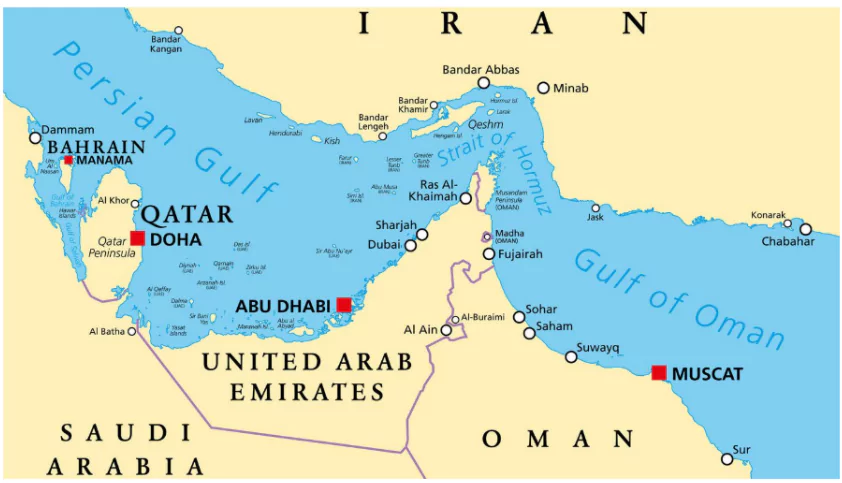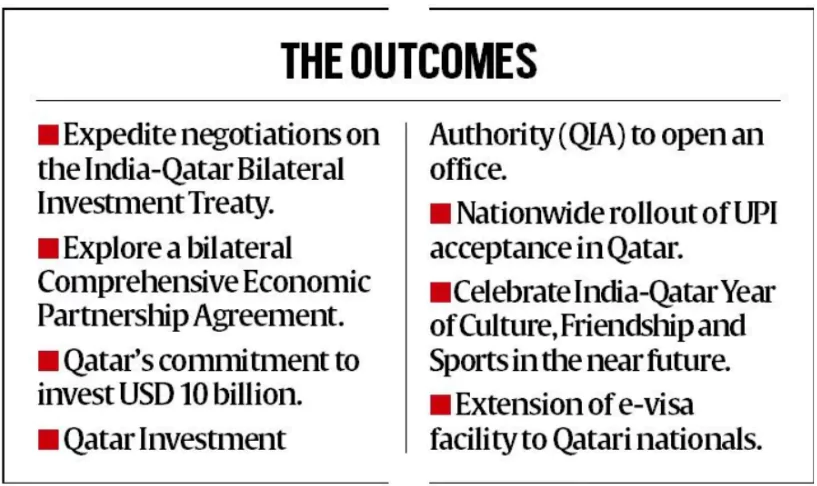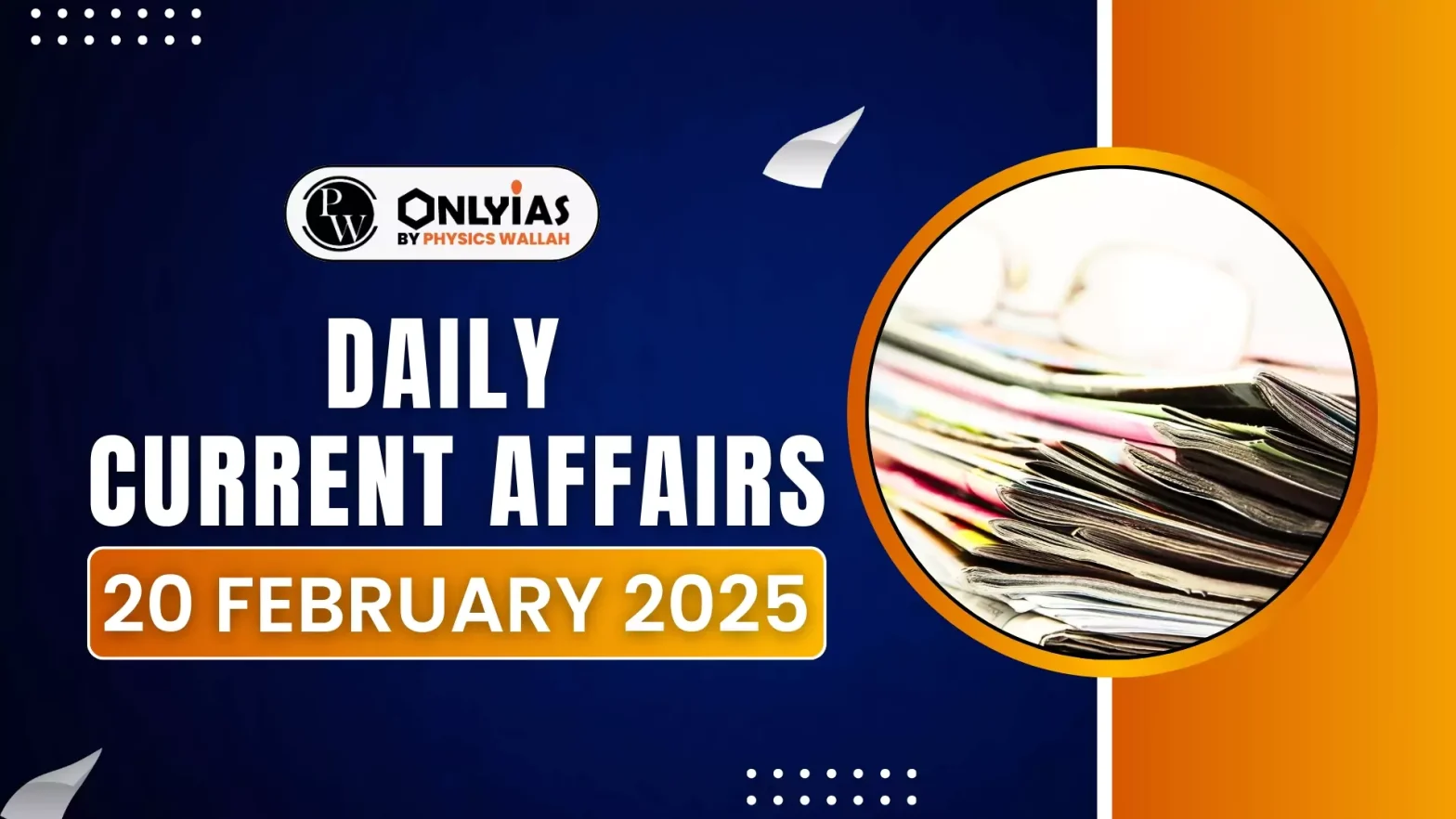The Amir of the State of Qatar, Sheikh Tamim bin Hamad Al-Thani paid a State Visit to India on 17-18 February 2025.
- This is the second visit of Sheikh Tamim Bin Hamad Al Thani to India as Amir of the State of Qatar.
Key Outcomes of the Meeting

- Strategic Partnership:
- India and Qatar have upgraded their relationship to a Strategic Partnership, joining other Gulf Cooperation Council (GCC) countries like the UAE, Saudi Arabia, Oman, and Kuwait.
- Economic and Trade Cooperation:
- Target to Double Bilateral Trade by 2030: Trade between the two countries is $14 billion annually, and they set a target to double it to $28 billion by 2030.
- Comprehensive Economic Partnership Agreement (CEPA): Exploration of a bilateral CEPA to further enhance trade and economic ties.
- Qatar Investment Authority (QIA): Qatar announced a $10 billion investment commitment in India, focusing on infrastructure, technology, manufacturing, and other sectors.
- Avoidance of Double Taxation: Revised Agreement for the Avoidance of Double Taxation and the Prevention of Fiscal Evasion with Respect to Taxes on Income and its Protocol
- Energy Cooperation:
- Both sides agreed to enhance energy cooperation, including mutual investments in energy infrastructure and regular meetings of the Joint Task Force on Energy.
- Digital and Financial Collaboration:
- Unified Payment Interface (UPI): Operationalization of India’s UPI in Qatar, with plans for a nationwide rollout, facilitating easier financial transactions.
- Settlement of Bilateral Trade in Local Currencies: Exploration of trade settlement in Indian Rupees and Qatari Riyals to reduce dependency on third-party currencies.
- Security and Counter-Terrorism:
- Both leaders condemned terrorism in all forms and agreed to enhance cooperation in intelligence sharing, cybersecurity, and law enforcement.
- Regular meetings of the Joint Committee on Security and Law Enforcement were emphasized.
- Cultural and People-to-People Ties:
- India-Qatar Year of Culture, Friendship, and Sports: Planned celebrations to strengthen cultural and sports ties.
- E-Visa Facility: Qatar welcomed India’s extension of e-visa facilities to Qatari nationals, facilitating easier travel.
 Health and Education Cooperation:
Health and Education Cooperation:-
- Health Collaboration: Strengthening cooperation in healthcare, including the export of Indian pharmaceutical products and medical devices to Qatar.
- Education: Enhanced institutional linkages, academic exchanges, and joint research initiatives between educational institutions.
- Multilateral Cooperation:
- Both sides emphasized the importance of UN reforms, including Security Council reform, and agreed to support each other’s candidatures in multilateral forums.
- Qatar assured full support for deepening India-GCC cooperation under the recently adopted Joint Action Plan.
Timeline of India-Qatar Diplomatic Relations
- 1971: Qatar gains independence from British rule.
- 1973: India establishes its Embassy in Doha, marking the beginning of formal diplomatic ties.
- 1999: Amir Sheikh Hamad bin Khalifa Al-Thani (Father Amir) visits India, the first high-level visit from Qatar.
- 2008: India and Qatar sign a Defence Cooperation Agreement to enhance maritime security.
- 2009: Qatar supplies LNG to India under a long-term contract.
- 2016 (June): PM Narendra Modi visits Qatar, leading to seven major agreements, including:
-
- Investment in India’s National Investment & Infrastructure Fund (NIIF).
- MoU between Financial Intelligence Unit – India (FIU-IND) and the Qatar Financial Information Unit (QFIU)
- 2018: India and Qatar renew their Defence Cooperation Agreement for another five years.
- 2019: India-Qatar Year of Culture is celebrated, enhancing cultural exchanges.
- 2023: India-GCC Joint Ministerial Meeting, chaired by Qatar, focuses on deepening ties.
- 2025: Qatar’s Amir visits India and signs a Strategic Partnership Agreement, committing $10 billion in investment and doubling trade targets to $28 billion by 2030.
India-Qatar Bilateral Relations
Political Relations
- Historically strong ties with regular high-level visits and diplomatic engagements.
- Ancient Era: India and Qatar shared strong maritime trade links, with Indian traders supplying textiles, spices, and pearls.
- Recent high-level visits:
- February 2025: Qatar’s Amir Sheikh Tamim bin Hamad Al Thani visited India and elevated ties to a Strategic Partnership.
- February 2024: PM Modi’s visit to Qatar focused on trade, energy, and investment.
- Key Political Agreements
- Exploring a Free Trade Agreement (FTA) between India and Qatar.
- Joint Task Force on Energy: Established in 2020, held multiple meetings.
- Joint Committee on Security and Law Enforcement: Focus on cybersecurity, counter-terrorism, and drug trafficking.
- Joint Working Group on Labour and Manpower Development: 7th meeting held in May 2022.
- Multilateral Cooperation
- India and Qatar support UN reforms, including restructuring the UN Security Council.
- Regular coordination in multilateral organizations like the UN, GCC, and WTO.
Defence & Security Cooperation
- India-Qatar Defence Cooperation Agreement (2008, renewed in 2018) facilitates collaboration in security and maritime issues.
- Defence Exercises & Visits:
- Indian Navy and Coast Guard regularly visit Qatar.
- Bilateral maritime exercise: “Za’ir Al-Bahr” (Roar of the Sea)
- Joint Defence Cooperation Committee (JDCC) meets periodically.
- Indian defence institutions provide training slots for Qatari personnel.
- Indian Air Force’s C-17 aircraft participated in COVID-19 relief efforts in Qatar.
- Doha International Maritime Defence Exhibition (DIMDEX): India regularly participates.
- Counter-Terrorism & Cybersecurity: Both countries unequivocally condemned terrorism and agreed to:
- Enhance intelligence sharing.
- Strengthen law enforcement cooperation.
- Address cyber threats, radicalization, and financial crimes.
- Participate in joint counter-terrorism efforts under multilateral forums.
Commercial & Investment Relations
- Bilateral Trade
- Bilateral Trade (2023-24): $14 billion
- Target for 2030: $28 billion (doubling in 5 years).
- India is Qatar’s 3rd largest trading partner.
- Qatar’s Key Exports to India: LNG, LPG, chemicals, petrochemicals, plastics, and aluminum.
- India’s Key Exports to Qatar: Cereals, copper articles, iron, steel, vegetables, fruits, spices, and processed food products.
- Energy Cooperation:
- LNG Supply: Qatar is the largest supplier of LNG to India, accounting for 48% of India’s global LNG imports.
- 2024 Agreement: QatarEnergy signed a 20-year LNG supply deal with Petronet LNG for 7.5 MMTPA starting 2028.
- LPG Supply: Qatar is also India’s largest supplier of LPG, accounting for 29% of India’s total LPG imports.
- Investment Relations
- Qatar Investment Authority (QIA) has invested $1.5 billion in India, focusing on:
- Infrastructure, power, retail, IT, healthcare, education, affordable housing.
- Qatar committed to investing $10 billion in India (2025).
- Joint Task Force on Investment (JTFI) to promote Qatari FDI in India.
- India-Qatar Free Trade Agreement (FTA) & Financial Integration
- India and Qatar exploring a bilateral FTA alongside India-GCC FTA negotiations.
- UPI Integration: India’s Unified Payments Interface (UPI) launched in Qatar to facilitate digital transactions.
- Discussion on bilateral trade settlement in local currencies.
Cultural Relations
- India-Qatar Year of Culture (2019): Over 45 cultural events organized in Qatar.
- International Day of Yoga: Qatar co-sponsored the UN resolution, and the day is celebrated annually.
- Ayurveda: Qatar has allowed the practice of complementary medicine, including Ayurveda.
- Regular cultural exchanges under the Agreement on Cultural Cooperation (2012).
- India participated in Qatar’s MENASA Year of Culture 2022.
Indian Community in Qatar
- Population: Over 835,000 Indian nationals (as of December 2023), making up 27% of Qatar’s total population.
- Contribution: Indians are highly regarded for their honesty, hard work, and contributions to Qatar’s development.
- Labour Reforms: Qatar has introduced reforms like the abolition of the Kafala system, minimum wage laws, and labour dispute settlement committees.
Significance of Qatar for India
- Energy Security
- Largest Supplier of LNG: Qatar is India’s largest supplier of Liquefied Natural Gas (LNG).
- In 2024, QatarEnergy signed a 20-year LNG supply deal with Petronet LNG, ensuring energy security for India, which is crucial for its growing economy and energy demands.
- LPG Imports: Qatar is also India’s largest supplier of Liquefied Petroleum Gas (LPG), accounting for 29% of India’s total LPG imports.
- LPG is essential for India’s domestic and industrial needs, particularly for cooking gas under schemes like Pradhan Mantri Ujjwala Yojana.
- Diversification of Energy Sources: Qatar’s stable and reliable energy supplies help India diversify its energy sources, reducing dependency on other regions and ensuring energy security.
- Economic and Trade Relations
- Trade: While India has a trade deficit with Qatar due to high energy imports, the relationship is mutually beneficial, with Qatar being one of India’s top trading partners in the Gulf region.
- Economic Diversification: Both countries are exploring opportunities beyond energy, such as technology, manufacturing, food security, and logistics, to diversify economic ties.
- Remittances: The Indian diaspora sends significant remittances back to India, contributing to India’s foreign exchange reserves and economic growth.
- UAE, Saudi Arabia, Kuwait, Oman, and Qatar collectively contribute 11% to India’s total remittances.
- Strategic and Defence Cooperation
- Defence Agreements: India and Qatar have a Defence Cooperation Agreement (signed in 2008 and extended in 2018), which facilitates joint exercises, training, and technology sharing.
- Maritime Security: Qatar’s strategic location in the Persian Gulf makes it an important partner for India in ensuring maritime security in the region.
- Indian Naval ships regularly visit Qatar, and both countries participate in the Doha International Maritime Defence Exhibition (DIMDEX).
- Counter-Terrorism and Security: Both countries cooperate on counter-terrorism, cybersecurity, and law enforcement through the Joint Committee on Security and Law Enforcement.
- Qatar’s role in regional stability aligns with India’s interests in the Middle East.
- Regional and Multilateral Cooperation
- Gulf Cooperation Council (GCC): Qatar plays a key role in the GCC, and India’s growing ties with Qatar enhance its engagement with the broader Gulf region.
- Qatar supported the India-GCC Joint Ministerial Meeting for Strategic Dialogue in 2024, fostering regional cooperation.
- Multilateral Forums: Both countries cooperate in multilateral forums like the United Nations (UN), where they support each other’s candidatures and advocate for UN reforms, including Security Council expansion.
- Food Security and Supply Chains
- Food Exports: India is a major exporter of food products, vegetables, and cereals to Qatar, ensuring food security for the Gulf nation.
- Qatar’s reliance on Indian food exports strengthens economic ties and provides a stable market for Indian agricultural products.
- Supply Chain Resilience: Both countries are working to strengthen supply chains, particularly in the post-COVID-19 era, to ensure the smooth flow of essential goods.
- Strategic Location and Connectivity
-
- Geopolitical Significance: Qatar’s strategic location in the Persian Gulf makes it a key player in regional geopolitics. India’s strong ties with Qatar help it navigate complex regional dynamics, particularly in the Middle East.
- Qatar’s role as a mediator in regional conflicts (e.g., Israel-Hamas negotiations) aligns with India’s interests in promoting peace and stability.
- Connectivity: Qatar’s world-class infrastructure, including Hamad International Airport and Hamad Port, facilitates trade and connectivity between India and the Gulf region.
Challenges in India-Qatar Relations
- Energy Dependence & Price Volatility: India is heavily dependent on Qatar for LNG and LPG, with Qatar supplying 48% of India’s LNG imports.
- Fluctuating energy prices impact India’s economy, and dependence on Qatar makes it vulnerable to supply disruptions.
- Trade & Investment Imbalance: India imports more than it exports, mainly due to energy imports.
- Total trade (2023-24): $14.08 billion, with India’s imports at $1.7 billion and imports at $12.3 billion.
- India has received $1.5 billion in FDI from Qatar, but investment approvals and regulatory hurdles delay projects.
- Geopolitical & West Asia Conflicts: Qatar has close ties with Iran, Turkey, and Islamist groups like the Muslim Brotherhood, which may not align with India’s interests.
- Qatar’s mediation role in the Israel-Palestine conflict and Taliban negotiations sometimes puts it in opposition to India’s diplomatic stance.
- Security & Terrorism Concerns: Qatar has been accused of funding radical Islamist groups, which raises security concerns for India.
- India needs to secure its energy supply routes from Qatar amid regional tensions in the Persian Gulf.
- Treatment of Indian Expatriates & Labor Issues: Reports of mistreatment of migrant workers in construction and service industries.
About Kafala System
- The Kafala system is a sponsorship system used to monitor migrant labourers, primarily in the Gulf Cooperation Council (GCC) countries.
- It legally binds migrant workers to their employers (sponsors) for their visa and legal residency, giving employers extensive control over their employees.
- Employers often confiscate the passports of migrant workers upon arrival, even though this is illegal in most host countries.
|
-
- During the construction of stadiums for the 2022 FIFA World Cup, reports emerged of poor living conditions and delayed wages for migrant workers.
- Legal challenges: Kafala system (sponsorship-based employment system) creates dependency on employers, sometimes leading to exploitation.
- Diplomatic Strains & Legal Issues
- Indian Navy Veterans Espionage Case (2022-2024): Eight former Indian Navy personnel were arrested in Qatar on espionage charges.
- Initially sentenced to death, later commuted after diplomatic intervention. One officer (Purnendu Tiwari) remains in Qatar, affecting diplomatic relations.
- Legal & Judicial Barriers: Slow legal processes in Qatar for Indian citizens facing trials.
- Visa and travel restrictions for Indian professionals.
- Free Trade Agreement (FTA) & Economic Barriers: Slow progress on India-Qatar FTA negotiations.
- Indian companies face restrictions in some Qatari sectors.
- Qatar’s protectionist policies make it difficult for Indian businesses to expand operations.
- Cultural & Religious Sensitivities: India’s policies on certain issues (e.g., CAA, NRC, Hijab Ban) have faced criticism in the Gulf, including Qatar.
-
- Controversial remarks by Indian politicians on Islamic prophet Muhammad led to diplomatic protests from Qatar (2022).
- Calls for boycotts of Indian products in Gulf nations over religious tensions.
Way Forward for Strengthening India-Qatar Relations
- Diversify Trade & Investment Ties: Balancing the trade deficit and attracting Qatari FDI will create a more sustainable economic partnership.
- Fast-track the India-Qatar Free Trade Agreement (FTA) to boost bilateral trade and remove tariff barriers.
- Strengthen Energy Cooperation & Price Negotiations: Reducing dependence on volatile LNG prices and diversifying the energy partnership will enhance India’s energy security.
- Expand cooperation in renewable energy, including green hydrogen, solar, and wind energy projects.
- Enhance Defence & Maritime Security Ties: Strengthening defence ties will boost regional security, maritime safety, and India’s strategic influence in the Gulf.
- Increase joint military exercises and naval cooperation for maritime security in the Persian Gulf.
- Improve Indian Expatriate Welfare & Labour Rights: Strengthen agreements on labor rights to ensure better working conditions for Indian workers.
- Protecting the 700,000+ Indian expatriates will improve India’s image and foster goodwill.
- Deepen Digital & Financial Cooperation: Strengthening digital and financial integration will enhance trade efficiency and boost economic collaboration.
- Expand India’s digital payment infrastructure (UPI) across Qatar for smoother remittances and business transactions.
- Explore local currency trade settlements (INR-QAR) to reduce dependency on the US dollar in bilateral trade.
- Strengthen Cultural & People-to-People Ties: Cultural diplomacy enhances soft power and strengthens long-term bilateral goodwill.
- Increase cultural exchanges, sports partnerships, and tourism initiatives (e.g., “India-Qatar Year of Culture”).
- Manage Geopolitical Sensitivities & Crisis Diplomacy: Strengthen India’s role in West Asia’s diplomatic efforts, ensuring neutrality on sensitive issues like Israel-Palestine.
- A proactive foreign policy will help mitigate diplomatic strains and protect India’s interests in the Gulf.
Conclusion
India and Qatar have elevated their ties to a Strategic Partnership with a focus on trade, investment, energy, security, and cultural exchange. Future cooperation will expand into renewable energy, startups, AI, and advanced technology while strengthening economic and people-to-people ties.
![]() 20 Feb 2025
20 Feb 2025


 Health and Education Cooperation:
Health and Education Cooperation: